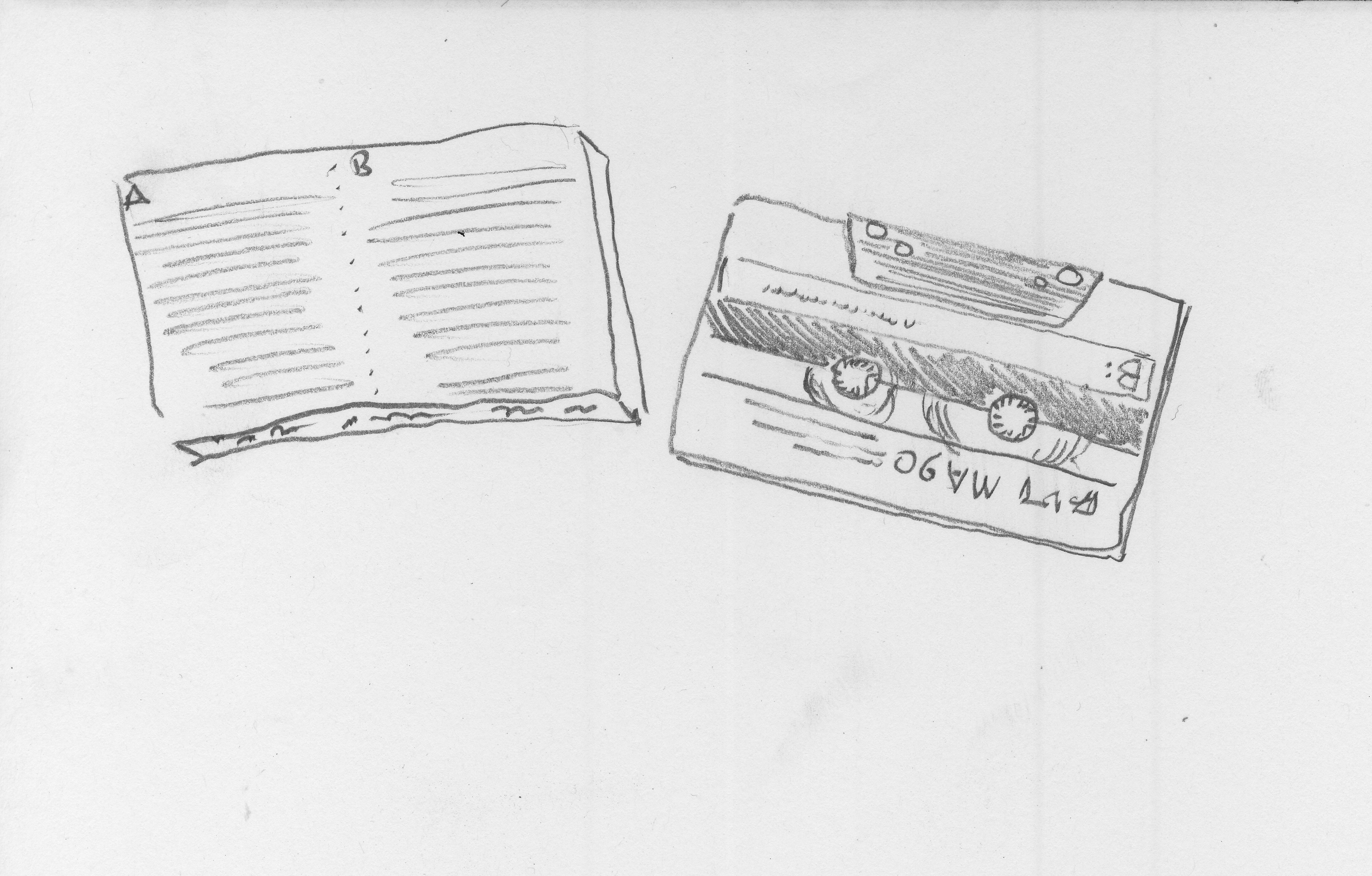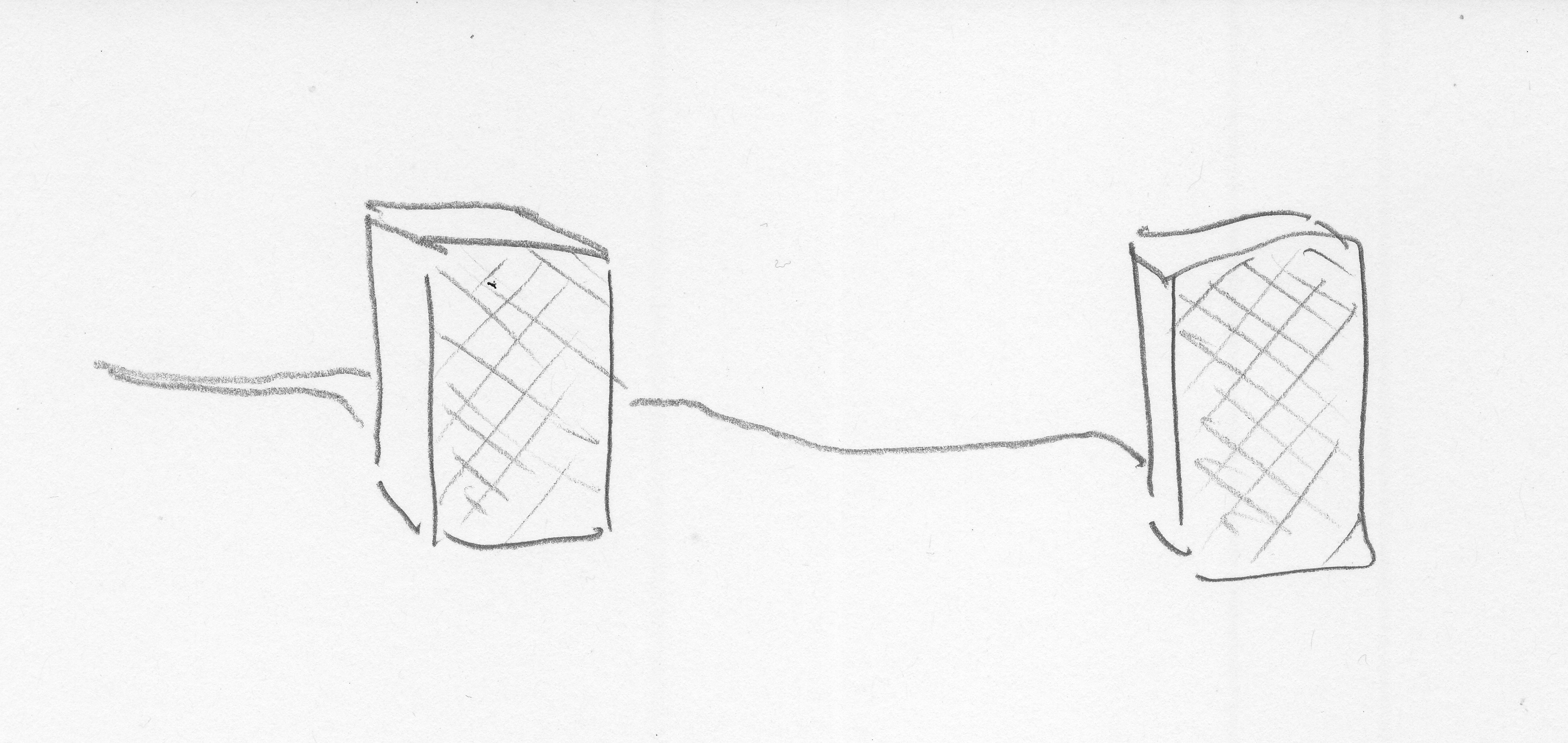 Advance warning, disclaimer, whatever: this is a very self-indulgent post. Skipping it is enthusiastically permitted. Encouraged, even. Move on. Or – –
Advance warning, disclaimer, whatever: this is a very self-indulgent post. Skipping it is enthusiastically permitted. Encouraged, even. Move on. Or – –
The cupboard above where all my shirts and jackets and chinos live is a repository for all kinds of nonsense: old computer programs that should have been disposed of an age ago, books that either aren’t seasonal or aren’t suitable, DVDs that have been found to be crap and undeserving of further viewing. There’s a beautiful wooden box up there that contains quite a bit of my personal memorabilia, and I’m happy with that. Otherwise there are a couple of things like tyre repair kits for the bike, or the box my watch came in, and a couple of ties that I actually do wear from time to time. But there’s also a bunch of cassette tapes.
Now I own a tape deck, and it still works. But I don’t play tapes very often. The last one I put on, it seems, was the Hoodoo Gurus’ Mars needs guitars, and I recall that Sall encouraged me to take it off again pretty soon after. 1980s Oz guitar rock isn’t really her thing – and fair enough. Some of the cassettes in my wardrobe are things I taped off CDs or LPs a million years ago (oops! Wouldn’t do it now), but the larger number feature myself in some manner or other.
I’ve just purchased a device that plays cassettes but links with a USB to the computer, so you can turn what you hear into digital files. I love it. I have gone back and pulled out the tapes of my undergraduate and graduate recitals, as well as my demo tapes when I was looking for gigs I didn’t get, or when I was auditioning for the National Jazz Awards at the Wangaratta Festival of Jazz and Blues (and not getting anywhere near the action on that either). We’re talking, like, twenty-eight years back, to begin with. More than half my life ago.
And some of what I have found is absolutely dismal. ‘Unthan plays execrably, sending a shiver of squeamishness, even outrage, through the theatre. Music is being molested here!’ (Michel Faber, The Crimson Petal and the White (Edinburgh: Canongate, 2002) 348). Hearing yourself at age 18 having a crack at ‘Stella by starlight’ can be, please let me tell you honestly, quite unspeakably ghastly. (For me, it is.) Some of the tapes are in considerable disrepair too, so the digital copies show the age of the sources.
I finished my undergraduate degree in 1992 and after that I thought it would be a spiffing idea to pop off and do a Diploma of Education. It wasn’t such a great idea as things turned out, although I suppose I have it in the bag if ever it is required. I met a couple of top people there but otherwise the course was a bit of an endurance test, and teaching rounds showed me in the most crystalline terms that high school classroom work was not for me. I passed, of course, because failure is impossible in today’s university climate, and emerged determined to do something else. During this time however I’d done a couple of performances at Mietta’s, thanks to the intercession of Tony Gould, and I suppose I’d been continuing to practise and thinking about what it was I’d learned as an undergrad. As luck would have it, the VCA (such as it was then – and how we mourn it) was inaugurating a Master’s degree in 1995 and when I spoke to Gould about study options he encouraged me to come along and join in.
Coming to the Masters was like entering another world entirely; all the barriers that had existed as an undergraduate between improv and rep students were broken down, destroyed; we shared everything and everyone was keen to learn. In a seminar that lacked a paper one afternoon the cry went up for someone to perform, and of course people said Tim! Tim! you get up and play! (because improvisers always have something to say) and I wound up doing a duo performance with, of all people, Rob Vincs, and it went off spectacularly and showed me what free music should have been like all along. (I had rejected free music because it was Brian Brown’s thing and he explicitly wasn’t keen on where I thought I wanted to go, jazz-wise. Rob was, well, how do you say? – one of Brian’s people, which is why it seemed odd that he’d volunteer to play with me. Still, he did, blessings be upon him – and it worked.) That VCA Masters had the capacity to show you in a moment all sorts of stuff that either you’d forgotten or neglected but from which you could learn, you could develop. It was a miraculous time. (Obviously they in Parkville came along later and fucked it all up. Royally.)
In about 1993 (I think – my memory is far from perfect) I’d started playing with Nick Haywood and Allan Browne in accompaniment of vocalist, Lisa Roberts. I wrote about this time in my memorial for Al so I won’t go into it again. The trio (as it subsequently became) was doing regular work by a year or so later and most surely thinking creatively about its profile and its future as I ploughed my way through first year Masters. That (1995) was the year that our first album, King, Dude and Dunce, came out so we were fully intending to be an ongoing thing.
Thinking to mix up ensemble and solo playing (as well as composed and free pieces) for my first year recital I wrote a big piece for Browne – Haywood – Stevens – obviously the occasion called for something more significant than a tune – and this was Spinning towards daylight. It was dedicated, as I recall, to someone with whom I am no longer in touch and towards whom my feelings changed dramatically, but that’s by the bye. Our trio rehearsed regularly in those days; Al’s music room was where the ensemble found anything it had, and we spent many happy and productive hours there. I can’t recall in any detail the process of preparing this music for performance, so when I put the tape on a couple of days ago I had no idea what to expect. But I was deeply touched by the sound of the trio in a forgotten context – the familiar sound of my beloved colleagues working at music that I had entirely displaced.
The file is too big to be appended to this post but if you’d like to hear the piece, click this.
Going back is always a thing to be done, and I’ve written about memory and the feelings that go with it elsewhere. If I flick back through the pictures I’ve shared on Facebook, as another example, I have quite some years’ experience reduced to a few dozen frames, but each has something precious in it to recollect. I do, truth be told, play my old albums from time to time and I’m pleased to hear when they hold up and I’m not ashamed of them. But because I was there when they were made and I did all the selecting-of-takes and the thinking-about-the-order and the writing-of-the-notes and the liaising-with-the-designer-about-the-cover and then the promotion-on-the-radio and the let’s-do-a-launch-event, and in the process listened to them some hundreds of times, I sort of know what I’m getting when I put them on. It’s a happy rehearsal of something that is consoling in its familiarity.
This has been different because I haven’t listened to this music in so long. I know King, Dude and Dunce and Sudden in a shaft of sunlight very well indeed, and of the gigs I recorded that the band did I listened to most of that material as I transferred it a couple of years ago from DAT to CD. But hearing Spinning towards daylight was a very different experience. A mixture of the familiar and the cherished with the completely forgotten.
When L. P. Hartley wrote, in The Go-between (London: Hamish Hamilton, 1953), that ‘The past is a foreign country: they do things differently there’ he was awarded one of those beautiful free passes to eternal presence through quotation. The simplicity and apparent plausibility of this axiom continue to support its employment. Sadly however I don’t completely buy it. It’s true in a sense, but there is also the possibility that one migrates as time passes. It’s not only they who abide/d in the foreign country. It’s possible to be reintroduced to experience one had, to things through which one lived, in that far-off land. And to continue to relate to them, to let them continue to grow, to grow with them.
The thing is that always one wants one’s next piece to be the best, to be happy with the release that is just appearing, to know that what is happening now has built effectively on whatever came before. That progress is being made, that time hasn’t been wasted. That the pursuit is worth continuing attention, that music as a thing on which to spend your life doesn’t completely suck. And at the most basic level when you go back to 1990 and hear yourself murdering ‘Stella’, and then consider, say, Media vita, then you can be pretty sure that you didn’t rest on whatever limp laurel you had collected to date. But that isn’t it, entirely; it’s far more complicated than that. One of the tapes I have is of a performance given at a venue called Rig 272 in South Melbourne that I think no longer exists. My recollection is that I played a trio set and there was at least one other band that performed, perhaps led by Sam Keevers. The program delivered there is similar to that given at my third year recital about a month later, although on that occasion Gary Costello was playing bass and Shelley Scown joined the group to sing a couple of pieces. The Rig gig had Philip Rex playing bass and Len Ramoskis on drums. I see Phil very occasionally these days and I’ve not seen Len for, well probably twenty years. But they’re playing with such energy – tunes of mine that they had to learn for me – and I doubt there was any money for the job as it came out of our being at VCA and someone (probably Gould) having generated an opportunity for us to perform. To listen to this collective endeavour is really humbling, and I recall with gratitude the trouble those guys took for my music. It’s the same with Al and Nick, although that band continued for five years or something and did the commercial CD thing and had paid gigs and all the rest of it. These colleagues gave me their time and their energy and their instrumental skills and their musical intelligence to help me along. Ivan Rosa and Justin Dwyer are implicated as well. And Jonathan Zion and Glenn Mortimer. They probably won’t know unless they Google themselves (they’re forgiven if they do!) but I’ve said it all the same. Hashtag gratitude.
The very real thing, then, is this: everything that matters is collaborative. Why can’t the people in charge see that?
28/vi/2018
